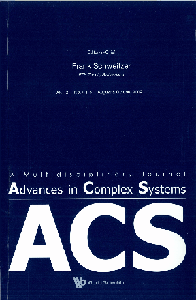ACS - Advances in Complex Systems
Publisher World Scientific, Singapore Website http://www.worldscientific.com/worldscinet/acs
The journal ACS is a classic in the area of complex systems research. It was established in 1997, and Frank Schweitzer is an editor of ACS since the very beginning. He became the editor-in-chief of ACS at the end of 2006 and took responsibility for a major overhaul of the journal. Changes involved a complete new editorial board of 20 editors, a refined aim and scope, a faster publishing schedule and, after all, a completely new cover layout. Ever since, ACS has grown both in visibility and reputation and is now considered a major outlet for truely interdisciplinary research. In addition to physics and mathematics, ASC also covers computer sciences, biological systems, social and economic systems, and traffic and environmental systems. Notably, ACS publishes topical sections on hot interdisciplinary topics such as 'Language Dynamics' or 'Guided Self-Organisation', but also topical issues from major conferences in the area of complex systems research. ACS is published with 8 issues/year plus, occasionally, supplementary topical issues. 
Aims and ScopeACS -- Advances in Complex Systems aims to provide a unique medium of communication for multidisciplinary approaches, either empirical or theoretical, to the study of complex systems. The latter are seen as systems comprised of multiple interacting components, or agents. Nonlinear feedback processes, stochastic influences, specific conditions for the supply of energy, matter, or information may lead to the emergence of new system qualities on the macroscopic scale that cannot be reduced to the dynamics of the agents. Quantitative approaches to the dynamics of complex systems have to consider a broad range of concepts, from analytical tools, statistical methods and computer simulations to distributed problem solving, learning and adaptation. This is an interdisciplinary enterprise. The goal of ACS, therefore, is to promote cross-fertilization of ideas among all the scientific disciplines having to deal with their own complex systems. These include, but are not limited to, biology, physics, engineering, computer sciences, economics, cognitive science and the social sciences. It is in fact the exchange of concepts and techniques developed within areas as diverse as spin glass physics, game theory, molecular biology, evolutionary optimization, or psychology - which has proven itself to be a major driving force in complex systems research. ACS predominantly publishes original research articles in the field of complex systems and encourages submissions of papers which result from collaborations across traditional academic disciplines. As a peer-reviewed journal, ACS is committed to the highest scientific standards. Papers published in ACS should be written in a way that makes them accessible to a wide range of scientific disciplines. For details, please see the Guidelines for Contributors in this journal. To encompass all aspects in the field of complex systems, papers in ACS are organized into five research sections, each of which is handled by a section editor. The list below - which is neither complete nor exclusive
Overview of Sections and Selected Topics(1) Fundamental Concepts of Complex Systems
Editorial BoardEditor-in-Chief Frank Schweitzer, Chair of Systems Design, ETH Zurich, Switzerland Section Editors Fundamental Concepts of Complex Systems Adaptive Social and Economic Systems Complex Computer Systems Armando Bazzani (University of Bologna, Italy)
|
||